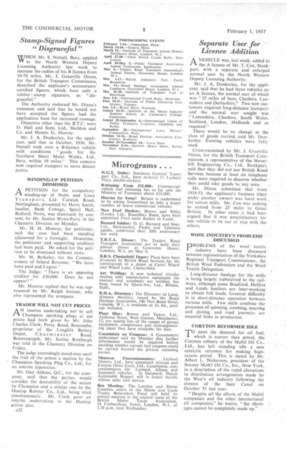Separate User for Licence Addition
Page 34

If you've noticed an error in this article please click here to report it so we can fix it.
AVEHICLE was, last week, added to the A licence of Mr. T. Cox, Stockport, with a separate and enlarged normal user by the North Western Deputy Licensing Authority.
Mr. J. A. Dunkerley, for the applicant, said that he had three vehicles on an A licence, the normal user of which was " 25 miles of base, Cheshire, Lancashire and Derbyshire." Two new customers required long-distance transport and the normal user sought was "Lancashire, Cheshire, South Wales, Scotland, London, Midlands and as required."
There would be no change in the class of goods carried, said Mr. Dunkerley. Existing vehicles were fully used.
Cross-examined by Mr. J. Granville Dixon. for the British Transport Commission. a representative of the Haverhill Engineering Co., Ltd., Stockport, said that they did not use British Road Services because at least six telephone calls were required to discover whether they could take goods to any area.
Mr. Dixon submitted that from 1934-53, the applicant's business (then under another owner) was local work. for cotton mills. Mr. Cox was seeking to extend from 25 miles to Great Britain. In other cases it had been argued that it was unsatisfactory for one vehicle to be out of step with the others.
WOOL INDUSTRY'S PROBLEMS DISCUSSED
PROBLEMS of the wool textile industry have been discussed between representatives of the Yorkshire Regional Transport Commissioner, the British Wool Federation and the Wool Textile Delegation.
. Long-distance haulage for the mills is being largely tratsferred to the railways, although some Bradford, Halifax and Leeds hauliers are inter-working to obtain full loads. Greatest difficulty is in short-distance operation between various mills. Few mills combine the processes of spinning, combing, weaving and dyeing, and road journeys are essential links in production.
CORYTON REFORMER IDLE TO meet the demand for oil fuel,
which is scarcer than petrol, the Coryton refinery of the Mobil Oil Co., Ltd., has left standing idle a new catalytic reformer for making highoctane petrol. This is stated by Mr. Albert L. Nickerson, president of the Socony Mobil Oil Co., Inc., New York, in a description of the rapid alterations in distribution arrangements made by the West's oil industry following the closure of the Suez Canal on October -31 last year.
"Despite all the efforts of the Mobil companies and the other international oil companies," he warns, 'the shortages cannot be completely made up."




































































































